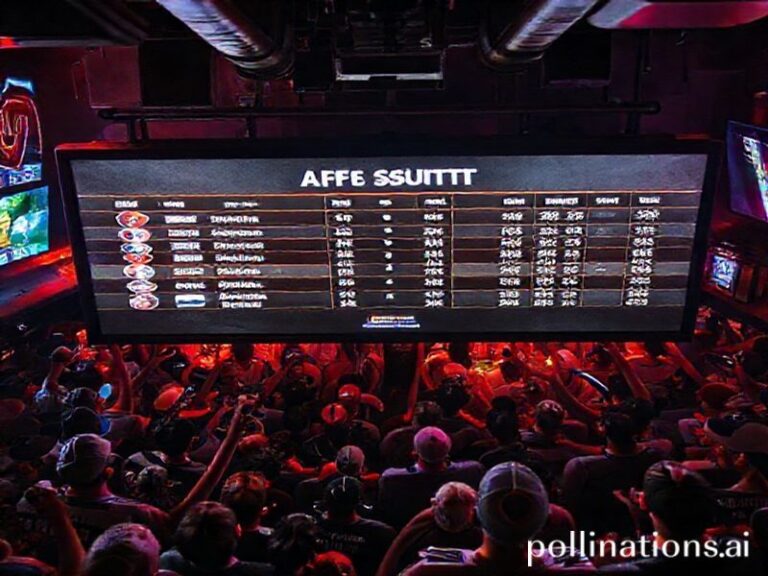Adele Conquers the Super Bowl: How a British Ballad Became the World’s Shortest Therapy Session
Adele at the Super Bowl: Britain’s Finest Export Sings the Empire Blues to 120 Million Glazed Eyes
By the time the first Dorito hit the carpet in Lagos and the last lukewarm samosa was microwaved in Mumbai, Adele Adkins—our collective national sob-story—had already converted the Super Bowl into the world’s most expensive open-mic therapy session. The NFL, a league that normally treats halftime like a military parade choreographed by PepsiCo, handed its crown jewel to a Tottenham girl who once rhymed “regret” with “cigarette.” The global takeaway was immediate: if the planet’s loudest sporting spectacle now needs a British balladeer to feel something, we’re all in deeper trouble than the crypto markets.
From Buenos Aires boardrooms to Bahraini living rooms, trading screens froze at 8:22 p.m. EST. Traders who’d spent the week shorting yen and long on existential dread suddenly had to factor “Adele-induced sentiment spike” into their algorithms. Tokyo’s Nikkei futures wobbled when she hit the first sustained C-major; Frankfurt’s DAX dipped during the spoken-word confession about postpartum anxiety. Somewhere in Davos, a hedge-fund oracle Googled “can tears be securitized?” while a Swiss intern Googled “who’s Adele?” The world’s economic engine, it turns out, idles at mezzo-piano.
The geopolitical subtext was impossible to ignore. The United States, still clinging to Pax Americana like a fraying security blanket, outsourced its cultural climax to a country it once evicted via tea and muskets. Britain, meanwhile, leveraged the slot as a soft-power coup d’état: forget aircraft carriers, send the woman who turned heartbreak into hard currency. Downing Street aides reportedly toasted with supermarket prosecco while calculating Spotify streaming royalties as a down-payment on NHS bedpans. Somewhere in Brussels, an EU commissioner drafted a regulation demanding all future halftime shows be 40% European content—accordion solo mandatory.
Adele’s setlist—three ex-files distilled into twelve pitch-perfect minutes—was a masterclass in weaponized nostalgia. When she launched into “Someone Like You,” Chinese censors cut the feed, fearing collective weeping might destabilize quarterly productivity targets. In Moscow, oligarchs paused mid-money-laundering to remember the first wife they’d traded for a super-yacht. Even the Taliban’s WhatsApp channels buzzed with grudging respect; apparently “Rolling in the Deep” translates well to Pashto metaphors about drowning in debt to warlords. The song is now reportedly ringtone royalty in 17 non-aligned nations.
Back in America, the cognitive dissonance was delicious. A nation that elected a former reality-TV landlord watched a working-class Londoner commandeer its most sacred jock ritual without a single touchdown reference. Fox Sports executives, high on ad-rate adrenaline, noted that the global audience surpassed the population of Europe plus several confused penguins live-streaming from Antarctica. Nielsen later confirmed that domestic beer sales dipped 7% during the performance, as viewers reached for the hard stuff capable of matching Adele’s key changes. Somewhere in Nashville, a tearful songwriter deleted his demo titled “Truck, Beer, Girl,” realizing the bar had been raised to stratospheric, Adele-shaped heights.
And then, the finale: fireworks spelling “HELLO FROM THE OTHER SIDE” in seventeen languages, including Klingon for the Elon Musk demographic. The stadium lights dimmed to reveal 100,000 LED wristbands synchronized to a single heartbeat—because nothing says global unity like mass-produced wearable tech. As drones formed the Union Jack over the Arizona desert, one could almost hear the ghost of Churchill muttering, “Never have so many owed so much to one smoky alto.”
Conclusion: In under fifteen minutes, Adele reminded a fractured planet that shared trauma is the last viable export. While the game resumed its scheduled concussions, the world exhaled in collective catharsis, then quietly updated its playlist. Whether this moment heralds a new era of Anglo-American emotional imperialism or merely delays the apocalypse by one more commercial break is anyone’s guess. But for one glittering slice of prime-time, we weren’t nations, markets, or demographics—we were just exes at varying stages of recovery, humming the same hook in 200 languages. God save the Queen of Heartbreak; she’s got the whole world in her throat.







